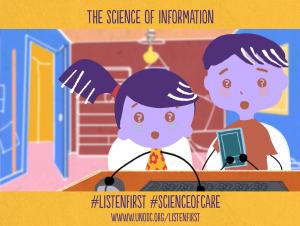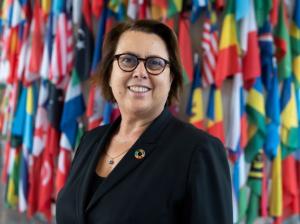On Science Day, UNODC (Listen First) and key female scientists urge changes for the education of young women
To celebrate the International Day of Women and Girls in Science, UNODC spoke with key female scientists about how to include more girls in the sciences.
Mentoring is important to show young women that they can make it. The more children are studying in science related fields, the more the overall approach to sustainable development is viable.”
VIENNA, AUSTRIA, February 9, 2021 /EINPresswire.com/ -- February 11th is the International Day of Women and Girls in Science. To mark this day, UNODC/Listen First spoke with key women scientists about the importance of education, how to include more girls in the sciences and how all children can access accurate information safely. — Simonetta Di Pippo
During the COVID-19 pandemic, people are relying more than ever on technology and the Internet not only to stay informed and connected, but to work and study. However, around the world, girls are not granted the same access to education as boys. According to UNESCO, 132 million girls are out of school worldwide and only 66% of countries have achieved gender parity in primary education.
An Italian astrophysicist, Simonetta Di Pippo is Director of the UN Office for Outer Space Affairs (UNOOSA). She is concerned about how policymakers are engaging with the issues. “The more children (boys and girls!) are studying in science related fields, the more the overall approach to sustainable development is viable.” She worries this is not clear to all policy makers and notes that digital infrastructure is a key issue in many developing countries. “UNOOSA are planning preliminary activities to see if we can bridge this digital space divide to help young girls in developing countries particularly to get access to education in a more safe and reliable manner,” she says.
On the ground in Kenya, geologist and CTBTO Youth Group Member, Magdalene Wanyaga knows the effects of the COVID-19 pandemic on young women and girls firsthand. “During the COVID-19 pandemic, many primary school girls here are getting pregnant; it’s becoming the norm,” she observes. “We need to empower young girls with knowledge, to let them know that we are capable of doing anything. Knowledge is the first step to protection.” Staying in school is a key element of substance use prevention.
Dr. Nora D. Volkow, M.D, is a research psychiatrist, scientist and Director of the National Institute on Drug Abuse (NIDA) in the United States since 2003. She was named one of Time Magazine’s “Top 100 People who Shape our World.” She agrees that education is a key component of resiliency to protect children and adolescents from risky behavior, including substance use. But the first line of protection is the support provided by the parents. In a video message recorded this year, Dr. Volkow shares: “We know that girls are more sensitive to negative effects of stress than boys. Parents should be very aware of the importance of providing social support systems that are emotionally meaningful so their children don’t feel lonely in the pandemic, that means more engagement from the parents. But if you don’t have the resources to pay attention to your children because you have to work two or three jobs to survive, that is going to put those children at a higher risk of substance use and mental disorder illnesses. We need to provide support that improves the situation for families.”
To that end, the United Nations Office on Drug & Crime (UNODC) is releasing its latest video, Science of Information, as part of the 'Listen First' campaign for parents, caregivers, educators and prevention workers to help children worldwide.
Dr. Volkow says, “Listen First becomes very relevant because listening will put the parents in a position where they are sensitive to the needs of their child. By listening to our children we can understand what the problems are and be able to do an intervention early, before it’s too late.”
The materials, including scientific resources, are all available to parents and caregivers in English, Spanish and French at: www.unodc.org/listenfirst.
To see the new Listen First video on Science of Information, click this youtbue link: https://youtu.be/zyFc7g9P63A
To see the complete interviews quoted in this article visit our website: www.unodc.org/listenfirst
Elizabeth Mattfeld
UNODC
+43 699 14598752
email us here
Visit us on social media:
Facebook
Twitter
LinkedIn
Listen First: Science of Information


